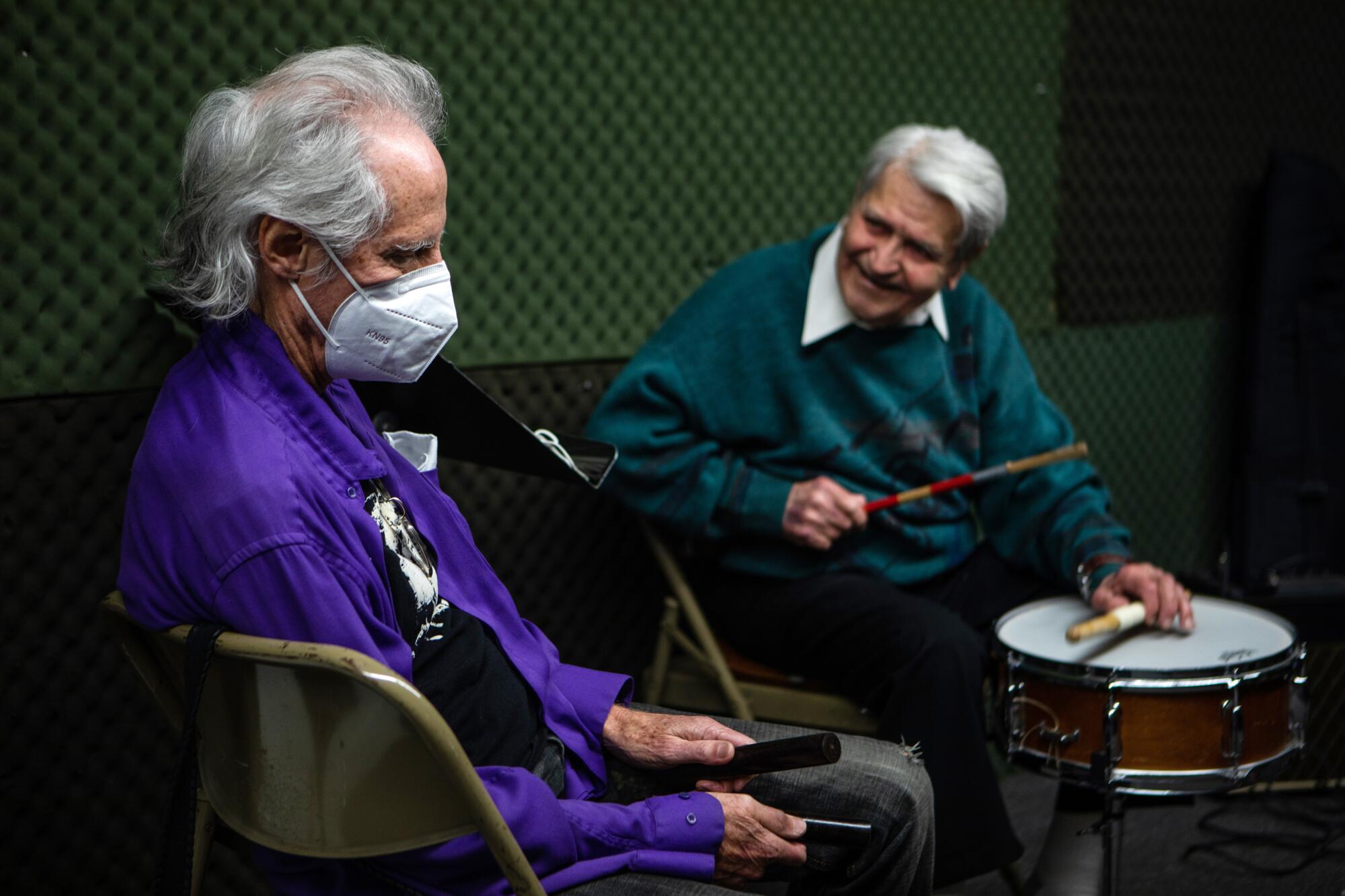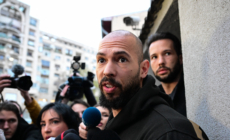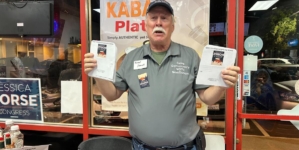-
Israel Strikes Across Lebanon After Ordering Evacuations of Southern Towns - 11 mins ago
-
Americans Urged To Boycott Saudi Arabia’s Neom Mega Projects - 37 mins ago
-
Shooting wounds Mexican Mafia member, kills another man in L.A. County - 49 mins ago
-
As Ukraine Fires U.S. Missiles, Putin Sends a Chilling Message - 55 mins ago
-
Andrew Tate’s Online ‘University’ Hacked: What We Know - about 1 hour ago
-
Israel Rally Around Netanyahu Over I.C.C. Warrant, for Now - 2 hours ago
-
Prince’s Text Messages to Kristin Chenoweth Revealed After Her Emmys Loss - 2 hours ago
-
Pennsylvania Senate Race Update: MAGA Celebrates as Bob Casey Concedes - 2 hours ago
-
Trump Tries on His Crown - 2 hours ago
-
Winter Weather Warnings in 15 States As 4 Feet of Snow To Hit - 3 hours ago
He crashed the Iron Curtain, lived his dream, ‘a beautiful struggle’
Steve Hideg was nearly broke when I met him in 2017, and wasn’t sure he’d be able to keep covering the rent on his humble little East Hollywood apartment.
But I’d never encountered a more upbeat guy.
He was blind in one eye and deaf in one ear from injuries suffered in the bombardment of Budapest in World War II. But at 85, the jazz drummer still had a couple of gigs to look forward to each week, and that was all he needed.

Wearing a suit and tie, Steve Hideg, 85, carries his drums into Callender’s Grill before his gig in 2017. He insists on carrying in his drums and setting them up himself.
Yes, he told me in his thick Hungarian accent, life was a struggle if you looked at things in terms of unpaid bills and mounting health problems.
“But it’s a beautiful struggle.”
L.A. Times photographer Francine Orr and I were looking for people living on the edge, and she hooked up with St. Vincent Meals on Wheels to scout out story possibilities. Hideg was on the delivery route, greeting his daily delivery person with a grateful, “Hello, my angel.”
“Even when I have only one meal in a day, I’m never hungry,” Hideg told me. That was partly because he had learned to survive on scraps of food for long stretches during the war, and it was partly because Hideg feasted, every day of his life, on music.

John Densmore, left, and Hideg play music together in the studio at Stein on Vine during Steve’s Saturday workshop in 2023 in Los Angeles.
That love affair began when, as a teen, he worked at a movie theater in Budapest and was dazzled by the jazz musicians who performed in American movies.
“I saw Louie Armstrong!” he told me as if it had happened yesterday. “He sang ‘Jeepers Creepers’ to a horse!”
And he saw the Glenn Miller Orchestra play “Chattanooga Choo-Choo” and “In the Mood.”
“Whewwwww, that did it for me,” Hideg said. “I fell in love with this whole country and its music. To me, it was the sound of freedom.”
But the journey to the other side of the wall wasn’t easy or without risk. During Soviet control of Hungary in 1956, Hideg and his wife, a pianist and singer, slipped past Russian soldiers one night, escaping first to Austria and later landing in New York.
Hideg studied the work of drummers Buddy Rich and Gene Krupa, and after getting off his night shift as a janitor, he dropped into New York jazz clubs to see Dizzy Gillespie and other giants, some of whom he was able to hang out with. In 1961, he and his wife headed for Hollywood, and before long, Hideg was living his dream.

Hideg, 91, sits at his dining room table, drinking coffee, listening to jazz on the radio at home as his caregiver cooks dinner Jan. 20, 2023, in Los Angeles.
He played L.A., Vegas and Florida, and worked on TV shows that had live bands, including “Truth or Consequences.” He also worked as an arranger and band leader on various jobs, and for a while he led his own crew — Steve Hideg and the Continentals.
It was steady work for a good stretch, but job opportunities gradually dwindled as the entertainment industry changed. Hideg still worked here and there, was always willing to perform for local charities, and couldn’t wait for Saturdays to roll around. That’s when he met fellow musicians at the legendary Hollywood music shop Stein on Vine, where he hosted a jazz workshop he called the Harmony Club, for the New York musician hangout where he’d been a janitor.
“He has this smile on his face, and somehow that got there because of music,” Doors drummer John Densmore said when I introduced him to Hideg at Stein on Vine.

Hideg, 85, gets dressed in his apartment in Hollywood in 2017.
That was in January 2023, when Hideg was playing drums with one hand, having injured his shoulder in another fall. Densmore jumped in on a ballad called “I Should Care,” joining pianist Cengiz Yaltkaya, saxophonist Jay Golden and guitar player Leo Vaz. Nobody in the room was more thrilled than Hideg.
When I first met him, the man known to some of his pals as “Cool Cat” still had one paid job in a band that performed Friday nights at Marie Callender’s in Mid-City. It wasn’t the Palladium or Disney Hall, for sure, but Hideg put on his suit and cinched his tie and headed to work in style, respectful of fellow musicians, the audience, and the great American art form that carried him through each day.
Several weeks ago, age and failing health began to catch up with Hideg, and he bounced back and forth between a hospital and a nursing home. When I visited him in the hospital, where he was pumped full of antibiotics to push back an infection, he was out of sorts and eager to get back to his life and his music.

Hideg, 91, walks up his steps to his apartment after playing his drum in his music workshop at Stein on Vine in 2023.
When Yaltkaya visited, Hideg asked him if he had any scissors.
“He said, ‘I want you to cut all these tubes and get me out of here and take me home.’”
There were still times, though, when Hideg was the same old guy.
“He was smiling in the ICU,” said Golden. “It was unbelievable.”
The last time I saw Hideg was in September at his nursing home, where his physical therapist told me he was super motivated to regain his strength and make it back home. He had arranged for one of his buddies, pianist Laszlo Cser, to put on a concert for residents. Hideg was back in his skin, beaming from his wheelchair as he bounced to “Somewhere Over the Rainbow,” “Some Day My Prince Will Come” and other tunes.

Steve Hideg plays jazz drums at Callender’s Grill in L.A. in 2017.
“My wife keeps saying it doesn’t matter if it rains or shines — Steve is always smiling and says it’s all fabulous,” Cser told me.
And that smile was no ordinary expression. It was a solar flare, starting somewhere deep inside of him and growing into a full-blown emoji. His jaw dropped and his body tensed in wild anticipation of uncompromised joy as he watched his buddies perform, followed by a cymbal crash of a cheer, the sound of eternal youth.
His philosophy of life was not complicated, Hideg told Orr in one of their many get-togethers. If “you’re an optimist, good things come your way. If you’re a pessimist, bad things come your way,” he said. He added that for him, faith was not necessarily a religious thing. It was a belief in the idea of finding a passion and pursuing it, regardless of age or obstacles.

Hideg goes to the market with his caregiver in 2023. He was infected with the coronavirus and then permanently injured his shoulder when he fell in his apartment. He now has a caregiver several days a week helping him with shopping, cooking, and transportation to doctor appointments.
Hideg’s view of the world, along with his positive energy, always gave me a lift. We went to a few concerts together, and he never talked about his own chops as a musician. He was all about reverence for the performers in front of him.
Steve Hideg was classy, gracious, old school, polite, a gentleman, a jazzy cool cat and a caring friend, and his beautiful struggle ended Oct. 17, when he died not long after his 93rd birthday.
“Steve … focused on the good in his life,” said Tyffyne Stuart, whose grandmother and Hideg were a couple for years, long after Hideg’s wife died. “It not only sustained him, but it grew and spread and inspired others. What a lovely soul.”
steve.lopez@latimes.com
Source link






















